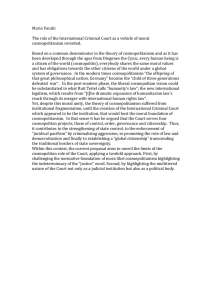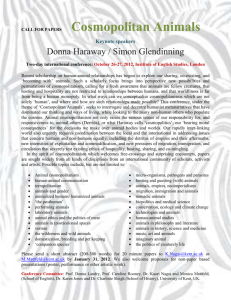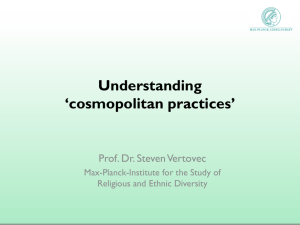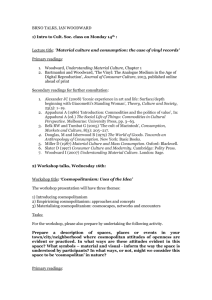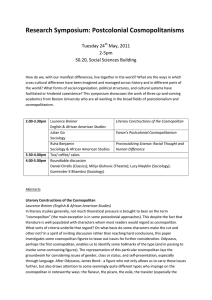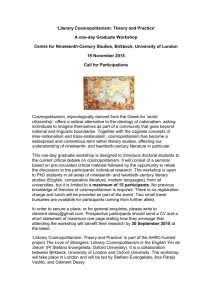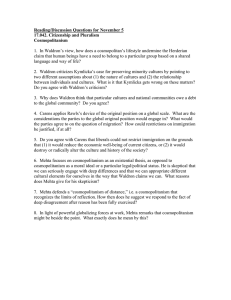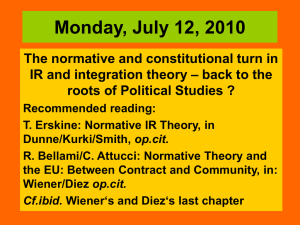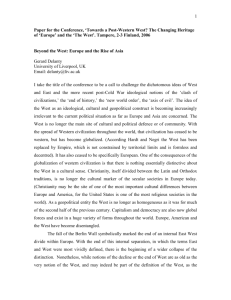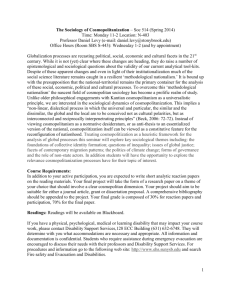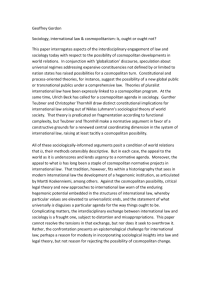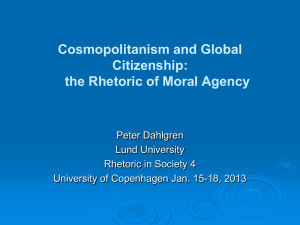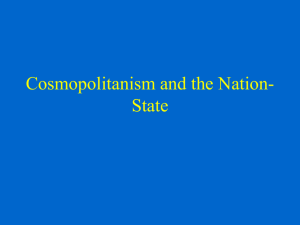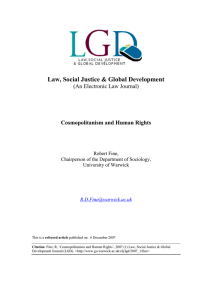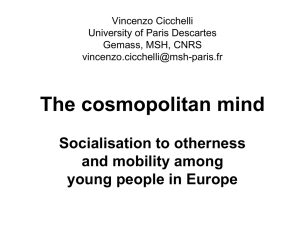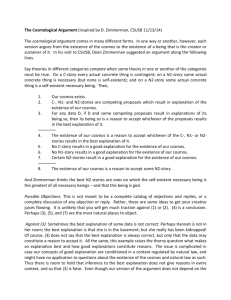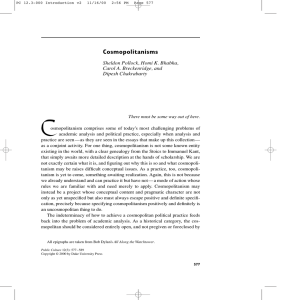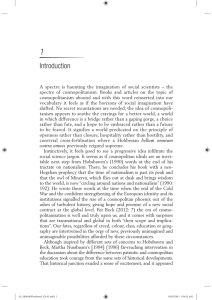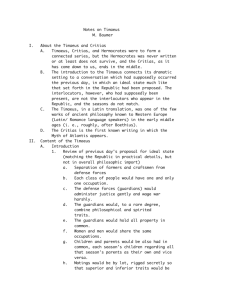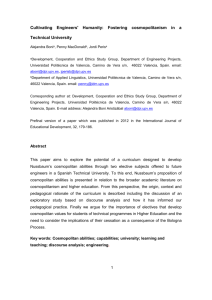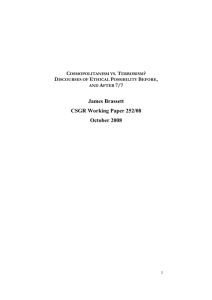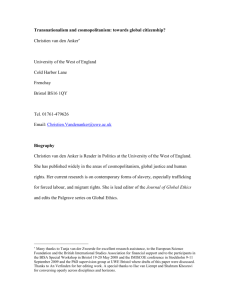COSMOPOLITAN THEORY
advertisement
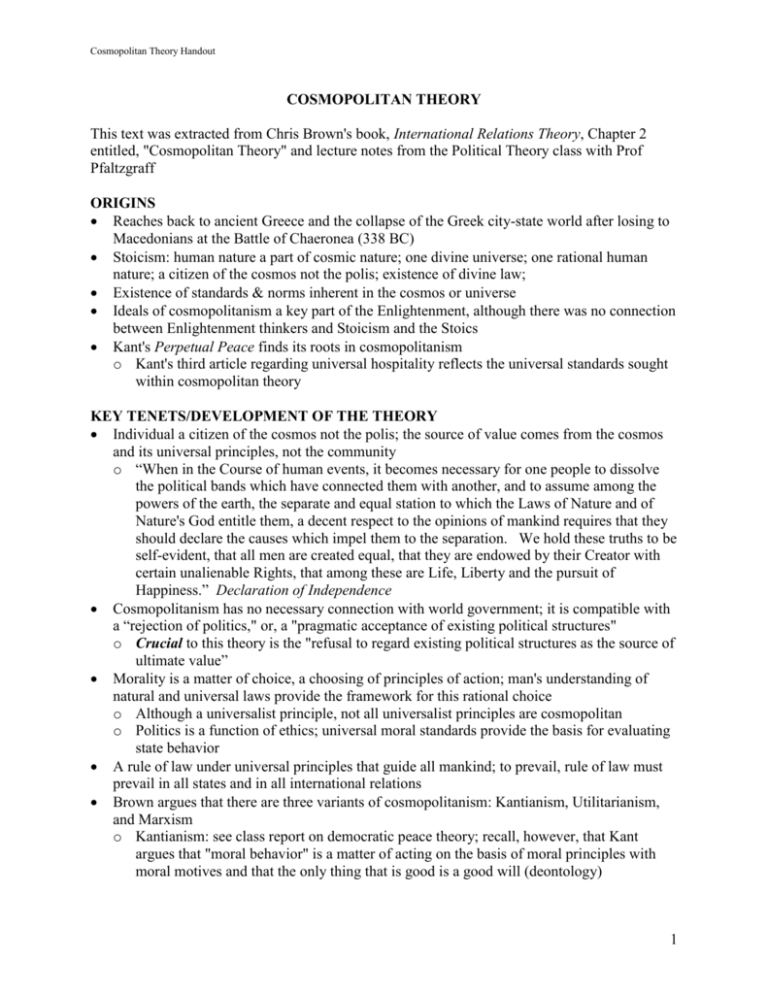
Cosmopolitan Theory Handout COSMOPOLITAN THEORY This text was extracted from Chris Brown's book, International Relations Theory, Chapter 2 entitled, "Cosmopolitan Theory" and lecture notes from the Political Theory class with Prof Pfaltzgraff ORIGINS Reaches back to ancient Greece and the collapse of the Greek city-state world after losing to Macedonians at the Battle of Chaeronea (338 BC) Stoicism: human nature a part of cosmic nature; one divine universe; one rational human nature; a citizen of the cosmos not the polis; existence of divine law; Existence of standards & norms inherent in the cosmos or universe Ideals of cosmopolitanism a key part of the Enlightenment, although there was no connection between Enlightenment thinkers and Stoicism and the Stoics Kant's Perpetual Peace finds its roots in cosmopolitanism o Kant's third article regarding universal hospitality reflects the universal standards sought within cosmopolitan theory KEY TENETS/DEVELOPMENT OF THE THEORY Individual a citizen of the cosmos not the polis; the source of value comes from the cosmos and its universal principles, not the community o “When in the Course of human events, it becomes necessary for one people to dissolve the political bands which have connected them with another, and to assume among the powers of the earth, the separate and equal station to which the Laws of Nature and of Nature's God entitle them, a decent respect to the opinions of mankind requires that they should declare the causes which impel them to the separation. We hold these truths to be self-evident, that all men are created equal, that they are endowed by their Creator with certain unalienable Rights, that among these are Life, Liberty and the pursuit of Happiness.” Declaration of Independence Cosmopolitanism has no necessary connection with world government; it is compatible with a “rejection of politics," or, a "pragmatic acceptance of existing political structures" o Crucial to this theory is the "refusal to regard existing political structures as the source of ultimate value” Morality is a matter of choice, a choosing of principles of action; man's understanding of natural and universal laws provide the framework for this rational choice o Although a universalist principle, not all universalist principles are cosmopolitan o Politics is a function of ethics; universal moral standards provide the basis for evaluating state behavior A rule of law under universal principles that guide all mankind; to prevail, rule of law must prevail in all states and in all international relations Brown argues that there are three variants of cosmopolitanism: Kantianism, Utilitarianism, and Marxism o Kantianism: see class report on democratic peace theory; recall, however, that Kant argues that "moral behavior" is a matter of acting on the basis of moral principles with moral motives and that the only thing that is good is a good will (deontology) 1 Cosmopolitan Theory Handout o Utilitarianism (Jeremy Bentham): argue that the only factor in determining the moral correctness of an act is the rightness or wrongness of its consequences Bentham included the state as an actor, but defined the role of the state as one promoting the general happiness by whatever means available; humans governed by two sovereigns, pain and pleasure o Marxism- adopts a class perspective and applies it universally; thus, the agent/actor becomes the proletariat and the desired outcome in purist Marxism would be a state where all are economically equal and work to serve the universal good Conflict for Marx occurs in the rift between the classes and their competing self interests AUTHORITY/PRIME ACTOR The key authorities are the universal principles which can change the behavior of individuals, and thus states o The independent variable becomes the universal principles from which the dependent variables alter behavior and one achieves harmony, cooperation, and peace (the agent of course is the individual; the basic duty of the individual is the happiness of mankind in general) If man adopts the universal principles, then man becomes more peaceful, more in tune with the cosmos and its true purposes If man is more peaceful, then states will become increasingly peaceful If states become more peaceful, then the cosmos will eventually achieve the perpetual peace that is a principle of the cosmos and something all naturally desire Thus, I suggest that the prime actor, while appearing to be the individual, could be the universalistic principles all should aspire to in order to fulfill this universal destiny in the cosmos NOTE: The text above is indeed very abstract in concept, which is precisely why it serves as the foundational theory for many theories o Cosmopolitanism is at the abstract end of a continuum from abstract to practical application LEVEL OF ANALYSIS View from the systemic, cosmos level; universalist in nature of level of analysis CRITICISMS No room for Realism in this theory; value and behavior not driven by the power game; others, obviously, find this to be untrue/naive Little ability for empirical analysis Little explanation of why wars occurred and what led to conflict and what brought conflict to resolution Carr writes extensively regarding the Utopian critique and many of those arguments would apply to cosmopolitanism POLICY IMPLICATIONS War must be abolished in order to provide a context in which 'free, equal, and self-reliant people can exist in security with justice' 2 Cosmopolitan Theory Handout Or, do we abolish states since it was/are states that go to war with each other? Or, do we establish a single world order with a universal authority (United Nations, The Federation (for Star Trek fans)? ASSESSMENT Cosmopolitanism provides a key way to divide the contending theories into two camps, cosmopolitanism and communitarianism (as opposed to a triad of Kantian, Grotian, or Hobbesian) This abstract theory still provides a basis today for the development of strategies governing the intercourse between states in the international environment 3
